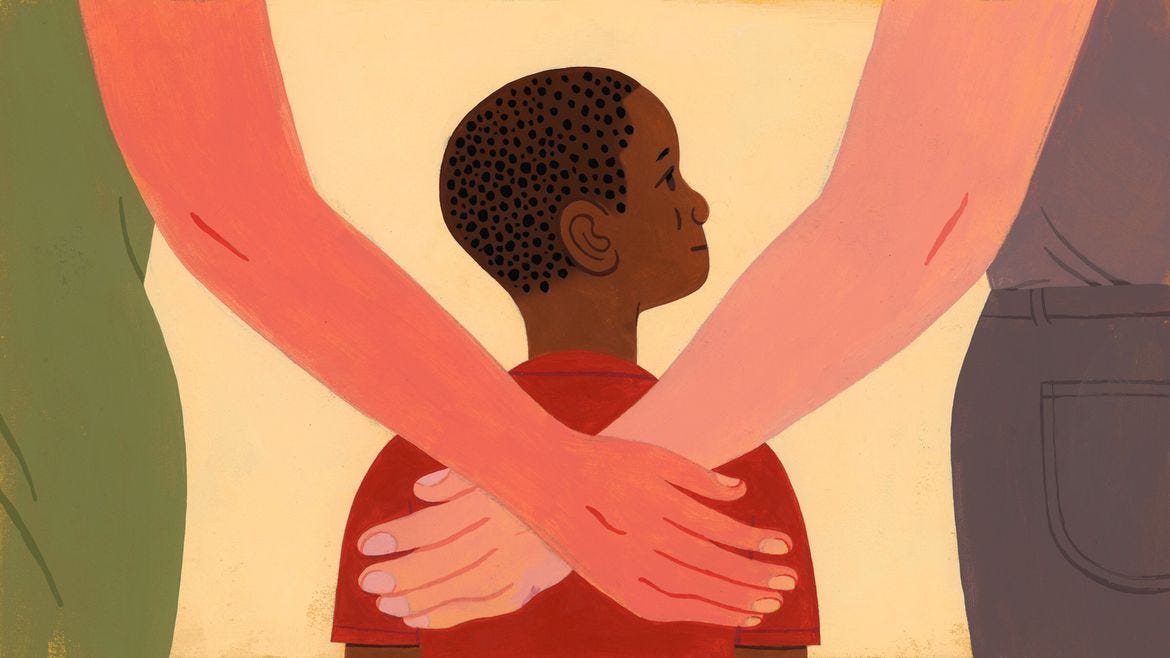Adoption, food that tastes like home, and a subscription deal
Welcome back to Memoir Monday—a weekly newsletter and monthly reading series, brought to you by Narratively, The Rumpus, Catapult, Longreads, Tin House, Granta, and Guernica. Each essay in this newsletter has been selected by the editors at the above publications as the best of the week, delivered to you all in one place. It may be the start of a new work week, but at least we have this great new writing to get us through it.

Why We Shouldn't Call Adoptees "Lucky"
by Tony Hynes (art by Celia Jacobs)
When we insinuate that an adoptee is lucky, we often invalidate the unique challenges they continue to experience after being adopted, and paint adoptive parents as saviors—when in fact they are simply parents, good and bad and wonderful and flawed as any parent can be. When we point to adoptees as lucky, we may also fail to look for ways to change systems that contribute to the trauma-inducing situations too many children and families experience.
Wanted/Needed/Loved: Sanae Yamada’s Favorite Foods
by Allyson McCabe and Esme Blegvad
Some of my Japanese-American cousins lived with us for long stretches of time. We’re a very tight family, and when we were together there was always a lot of focus on meals. Whatever else we put on the table, rice and shoyu was always the linchpin. We had it for dinner every single night of my childhood. It’s intimately tied to my sense of home.
It Comes in Waves
by Lilly Dancyger
Every time someone shared a news update about Kim, or the scholarship fund that had been set up in her name, I felt that same cold and tingly feeling, and I pictured blades hitting bone, echoing in the underwater metal of a submarine; imagined how she must have felt when she realized what was happening to her and that there was no escape route. Each update came days, weeks, sometimes months after the last, unexpected, out of nowhere — grief and horror that came in waves, like body parts washing up on shore.

My Secret Life as a Mysterious Multimillionaire’s Personal Assistant
by DW McKinney
When my tears dried, I got angry at Zander. He knew the bribe’s obvious illegality would have harsher repercussions for me, a black woman, yet he still ordered me to do it. Any doubts I had about his previous overtures were clarified. I was not a trusted confidante, I was simply there to ease his ego while providing a service. For me, holding that envelope meant doing the tasks that were beneath a rich white man, under the guise of good will.
I Am Telling You What Happened To Me
by Susannah Nevison
I leave class thinking about the word “civilian.” How it’s tied to “civil” and “civility.” How I can’t seem to find anything civil left in the political discourse I analyze with my students, or in the countless headlines about sexual assault or mass shootings. It’s a civilian who videotapes the rape of an unconscious girl in Steubenville, Ohio. It’s a civilian who uses a Bushmaster XM- 15 rifle and a .22-caliber Savage Mark II rifle in Newtown, Connecticut. A civilian, by definition, is neutral; neutrality, by extension, is ordinary. And this is what I keep coming back to: extraordinary acts of violence, committed by ordinary individuals.
Writers’ Resources
Subscriptions to Granta are 40% off to celebrate the magazine’s 40th birthday!
The October 21 Memoir Monday reading will be a special edition, featuring writers who have contributed to one or more of the partner publications AND my forthcoming anthology of essays on women’s anger, BURN IT DOWN. Rsvp here.

Thanks for reading! If you enjoy Memoir Monday, please consider making a one-time or recurring contribution (if even a fraction of subscribers signed up to contribute $1 per month, Memoir Monday could be self-sustaining!) by clicking here.
If you received this email from a friend or found it on social media, sign up below to get Memoir Monday in your inbox every week!
Until next Monday,




